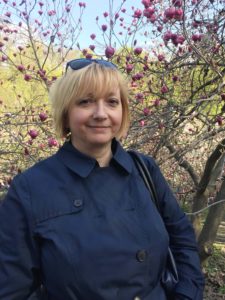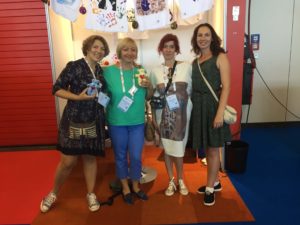 Author: Olya Kulyk, ICF “AIDS Foundation East-West” (AFEW-Ukraine)
Author: Olya Kulyk, ICF “AIDS Foundation East-West” (AFEW-Ukraine)
The executive director of International Charitable Foundation “AIDS Foundation East-West” (AFEW-Ukraine) Olena Voskresenska is telling about the main achievements of organisation in 2018 and its plans for 2019.
– Olena, how was the year of 2018 for AFEW-Ukraine?
– 2018 was a very active and diverse year for AFEW-Ukraine. During the last year we strengthened and expanded our work on empowering key communities, developing community leaders and facilitating the dialogue between the communities. In our work with adolescents who use drugs within the project “Bridging the gaps: health and rights for key populations”, the special focus was on developing youth leaders. In 2018, young activists from four regions of Ukraine had a chance to develop their own projects, and small grants that we provided to them allowed young people to implement youth-led projects in their regions. Through the Country Key Populations Platform, that we continue to support, we had an opportunity to learn more about the needs of different key populations – people who use drugs, sex workers, LGBT, and ex-prisoners. We also help the communities to develop communication algorithms to ensure that the voices from the most remote areas of the country are heard by the community leaders.
Besides, at the end of the year, we started the project aimed at empowering HIV-positive women in Kyiv and Cherkassy as advocates for their rights. The project was supported by the Embassy of Norway – a new donor for our organization.
– What were the three main achievements over the past year that you can determine?
– Since 2011, AFEW-Ukraine has been working with adolescents who use drugs, and I am very proud that in 2018 we managed to expand this work to small cities and rural areas of Ukraine. It was possible thanks to the project “Underage, overlooked: Improving access to Integrated HIV Services for Adolescents Most at Risk in Ukraine” that is supported by Expertise France – Initiative 5%. The project is implemented in cooperation with Alliance of Public Health, and now services for adolescents who use drugs are developed in 28 small cities of seven regions of Ukraine. Initial project research, that is now being finalized, is the first of its kind not only in Ukraine but probably in most of the countries of Eastern Europe and Central Asia (EECA).
In 2018, AFEW-Ukraine supported the development of standards on rehabilitation for the Ministry of Social Policy. I am very proud that we managed to bring together a good team of experts for working on the standards, including a representative of the community of people who use drugs. We hope that these standards will help to improve the quality of rehabilitation services in the country, based on the best international practices, human rights approach and needs of the community. We are very much looking forward to further work in this direction not only in Ukraine but also in Georgia.
 2018 was also a very important year for all HIV service organisations, as it was the year of the 22nd International AIDS Conference that took place in the Netherlands. Being a part of AFEW Network, with AFEW International Secretariat in Amsterdam, we worked hard to ensure maximum involvement of EECA participants in the conference and attracting attention to our region. I am very happy that we managed to support a large delegation of AFEW-Ukraine partners, including young activist from Kropyvnytskyi, representatives of the community of people who use drugs, and HIV-positive women from Ukraine.
2018 was also a very important year for all HIV service organisations, as it was the year of the 22nd International AIDS Conference that took place in the Netherlands. Being a part of AFEW Network, with AFEW International Secretariat in Amsterdam, we worked hard to ensure maximum involvement of EECA participants in the conference and attracting attention to our region. I am very happy that we managed to support a large delegation of AFEW-Ukraine partners, including young activist from Kropyvnytskyi, representatives of the community of people who use drugs, and HIV-positive women from Ukraine.
– What are the plans of the Foundation for 2019?
– In 2019 we will continue working with young people in Ukraine, focusing on their active involvement in decision-making processes, including monitoring of the local budgets. I hope that we will be able to expand our work to include young detainees in our projects.
Developing harm reduction friendly rehabilitation remains a priority for us, and we will stimulate the changes in current rehabilitation practices in Ukraine and Georgia with our local partners. Also, we are very much looking forward to closer working with HIV-positive women in Ukraine, disseminating the successful model of immediate intervention that was already tested in Kyiv, to Cherkasy, and potentially other regions of the country. In 2019 we are also planning to revise our strategic plan, which will define the priorities of AFEW-Ukraine’s work for the upcoming several years.



